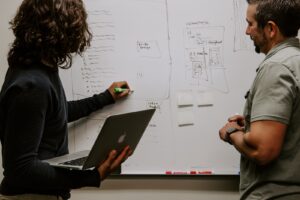Understanding Self-Reflection and Accountability
Epictetus’ Wisdom on Education and Responsibility
Education, as Epictetus teaches, is not just about acquiring knowledge, but understanding the importance of **responsibility**. He captures this idea in his famous quote, “To accuse others for one’s own misfortunes is a sign of want of education. To accuse oneself shows that one’s education has begun. To accuse neither oneself nor others shows that one’s education is complete.” This emphasizes that true **education** goes beyond books, extending into our behavior and attitudes. By reflecting on this, we see the importance of accepting responsibility for our own lives and actions. Shifting blame onto others, as Epictetus points out, is a sign that one has yet to **comprehend** the deeper aspects of **self-awareness** and personal development.
In business, this philosophy resonates strongly. **Executives** and managers who continuously blame external factors for their failures may find themselves hindered in their professional growth. A **self-reflective** leader, on the other hand, understands the value of introspection. They recognize mistakes, take accountability, and adapt accordingly. This **responsibility** fosters a culture of trust and openness within their teams, encouraging others to be honest about their **shortcomings** and growth areas.
In **life** and business, education is a continuous journey. As we move from blaming others to acknowledging our own faults, we evolve in our understanding. The final stage of **education**, as described by Epictetus, is to transcend blame altogether, becoming fully aware of the complexities of **human** experiences. At this stage, one recognizes that success and failure are parts of a larger **process** influenced by countless factors, many of which are beyond individual control.
The Path to Self-Improvement through Education
To reach the point of no longer blaming others or oneself, one must first confront their biases and embrace humility. This aspect of **education** is crucial for leaders who wish to inspire and motivate others. The process begins with an honest appraisal of one’s strengths and weaknesses, followed by a willingness to learn and adapt. Self-improvement, in this context, becomes a journey of embracing failure and **transforming** it into valuable lessons.
Within **organizations**, fostering a culture that values personal growth and **accountability** is essential. Leaders must set the example by accepting their own **shortcomings** and being open to feedback. This environment encourages employees to own their responsibilities, leading to higher morale, productivity, and a stronger **commitment** to the organization’s goals. A **self-aware** workforce recognizes the importance of collaboration and understands that collective success is achieved through individual growth.
Epictetus’ teachings remind us that true education is not about passing **blame** but about mastering oneself. In today’s fast-paced and highly competitive world, this lesson is particularly relevant. As professionals, we should strive to practice **self-reflection**, embrace responsibility, and **commit** to continuous learning. By doing so, we can achieve personal and professional growth, inspire others, and create a positive impact in our **workplaces** and communities.
Embracing Self-Awareness in Personal Growth
The path to true education, as articulated by Epictetus, involves cultivating **self-awareness** and recognizing that growth begins with understanding oneself. This **awareness** helps identify areas where one needs to improve and where they excel. In the context of leadership, this is crucial, as leaders must navigate the delicate balance of **encouraging** their teams while also ensuring accountability for their **actions**. A leader who understands their own strengths and **limitations** can better guide their team toward success, demonstrating that true leadership involves continuous **self-improvement**.
Embracing self-awareness also means understanding how one’s **actions** impact others. In a business environment, where collaboration and teamwork are essential, individuals who are conscious of their behavior can better foster positive relationships. This not only improves workplace dynamics but also enhances overall productivity. By recognizing and addressing one’s faults, professionals can become more effective in their roles, fostering an environment where **personal development** and **accountability** are prioritized.
The Role of Accountability in Achieving Excellence
Accountability is a cornerstone of **excellence**. When individuals and leaders alike take responsibility for their actions, it establishes a culture of trust and reliability. This sense of **ownership** is vital for businesses aiming to thrive in competitive markets. Employees who feel empowered to take responsibility are more likely to innovate and make decisions that benefit the organization. They understand that **mistakes** are part of the learning process and use them as stepping stones toward improvement rather than shifting blame.
As professionals embrace accountability, they also learn to foster it within their teams. Leaders who model accountability set a standard that encourages others to do the same. This creates a workplace environment where **transparency** and **honesty** are valued, leading to better communication and collaboration. Such an environment nurtures **innovation** and adaptability, as employees feel safe to explore new ideas and solutions without fear of undue criticism.
#Education #Responsibility #SelfReflection #BusinessGrowth #Leadership









